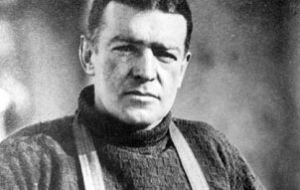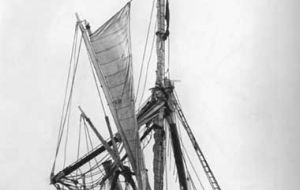MercoPress. South Atlantic News Agency
Falkland Islands and the saga of Sir Ernest Shackleton a century ago
 The expedition left England by the wish of His Majesty shortly after the outbreak of war in 1914 in the stout little Endurance
The expedition left England by the wish of His Majesty shortly after the outbreak of war in 1914 in the stout little Endurance  On 3 June 1916, Stanley had ever seen so many people at the new Town Hall, to welcome Sir Ernest Shackleton who gave a brief account of his late expedition
On 3 June 1916, Stanley had ever seen so many people at the new Town Hall, to welcome Sir Ernest Shackleton who gave a brief account of his late expedition  In March 1915 the Endurance was definitely iced up and thereafter the party lived in daily and hourly danger of their home being crushed to pieces
In March 1915 the Endurance was definitely iced up and thereafter the party lived in daily and hourly danger of their home being crushed to pieces One hundred years ago this month Sir Ernest Shackleton set sail from Plymouth on HMS Endurance at the beginning of the Imperial Trans-Antarctic Expedition (1914-17), also known as the Endurance Expedition.
The expedition aimed to make the first land crossing of the Antarctic continent. It failed to accomplish this but instead became recognized as an epic feat of endurance when Shackleton rescued all 27 of his men and bought them home without a single loss of life.
Falkland Islands Journal Editor Jim McAdam, who attended a commemorative event in Plymouth, kindly provided Penguin News with the following account of Shackleton’s first public lecture, which was held in the Falkland Islands in May 1916.
The account of Shackleton’s journey to Elephant Island, then in the James Caird to South Georgia, the crossing of South Georgia and his four subsequent attempts to rescue the remainder of his men on Elephant Island has been well documented.
During the period between rescue attempts No. 2 from the Falklands and No. 4 from Punta Arenas, Chile, Shackleton was keen to publicize the plight of his men through recounting all that had happened to them and to raise public support.
The first public lecture Falkland Islands
Shackleton arrived (with Tom Crean and Frank Worsley) in Stanley, Falkland Islands on 31st May 1916. He gave what was his first public speech on his return in the Town Hall on June 3.
The speech is summarized in the Falkland Islands Magazine and Church Paper (July 1916) under the heading ‘The Antarctic Expedition’ and it attracted one of the, “largest gatherings Stanley has ever seen. “At the end of his account, a simple and unvarnished story, Sir Ernest was heartily cheered in recognition of the pluck exhibited by him and his intrepid companions”.
A summary of the talk is reproduced below, by kind permission of the late Jane Cameron, Archivist, Falkland Islands Government.
Town Hall, Stanley, Falkland Islands, 3rd June 1916 From - The Falkland IslandsMagazine and Church Paper, July 1916.
The Antarctic Expedition
On the 3rd of June in weather harmonizing with the occasion one of the largest gatherings Stanley has ever seen was collected at the new Town Hall to welcome Sir Ernest Shackleton who had kindly consented to give a brief account of his late expedition to the Antarctic.
The chair was taken at 3 pm, by His Excellency the Governor who read a cable message from His Majesty the King, congratulating Sir Ernest on his safe return, and stating that every effort was being made to rescue immediately the 22 men left imprisoned on Elephant Island.
Sir Ernest, who still bore traces of the privations and anxieties of many months duration, gave an account of his adventures. With him on the platform were two of his comrades who had accompanied him on the whaler from south Georgia arriving here on the 31st May, Capt. Worsley.
The expedition left England by the wish of His Majesty shortly after the outbreak of war in 1914 in the stout little Endurance, a vessel prepared as far as human forethought and experience could devise to meet all emergencies.
After touching at Buenos Aires in November the ship got into the ice in mid December from which it practically never emerged.
In the ordinary course of events the explorers should have been able to feel their way further south through the floes and ice-field during the summer, landing their stores and equipment and making preparations for a dash across the Pole in the summer of 1915/16.
Luck was however against them. Held up in the ice they could only drift at its mercy. In March 1915 the Endurance was definitely iced up and thereafter the party lived in daily and hourly danger of their home being crushed to pieces. What work was possible was conscientiously done: the dogs were trained and exercised, observations taken and scientific work carried out. All was made ready in case fortune turned and curious to relate, much work was performed at night to avoid the great heat of the short lived day.
The dogs, carefully picked for strength and stamina and able to drag over 100 pounds each, originally numbered 69 and though some were lost the deficiency was more than made up by litters born on the journey.
For long months their hopes rose and fell as the pressure of the ice diminished or increased, but at last in spite of all precautions the stout ship was crushed by the irresistible pressure, and it became necessary to abandon. The boats had been got out in case of such a disaster and laid on the ice together with the stores and equipment it was possible to save. The dogs, so carefully trained, had to be shot since it was no longer possible to feed them.
Stranded on a huge ice floe the explorers were at the mercy of wind, tide and weather, with the added dangers due to the vagaries of ice. They drifted in a northerly direction some thousand miles on their precarious float, the ice cracking continuously in long fissures and the floe getting smaller and smaller, till gradually by slow degrees it was reduced to a bare 100 square yards. On one occasion the ice split under their very tent and one of the party who fell through wrapped in his sleeping-bag was rescued with difficulty.
So month by month they drifted till in April 1916 they sighted, 50miles away, the snow-clad slopes of Elephant Island. After those 16 weary months in ice they took to their boats and started on their perilous voyage. Against gales and storms they made their way and at length they reached the island. But this could only be an insecure halting place, and the boats were by now insufficient to transfer the whole party to safety.
Hewing a cave in an ice cliff, 22 of these intrepid men were left with scarce full rations for 5 weeks supplemented by a couple of seals they had killed.
Sir Ernest and five others, volunteered to make a bold bid for assistance and left the island on April 16th in an open boat only 22 feet long, to attempt the forlorn hope of traversing the 750 miles of wintry seas which lay between them and South Georgia.
After great privations, almost worn out, they reached South Georgia and after a perilous passage through the rocks beached their boat in a small bay at the back of the Island. Owing to the dangers of the tide they were compelled, exhausted as they were, to seek better shelter, and seven miles down the coast they found another bay slightly better for the purpose.
There three men were left, too worn out to proceed; the others scaled the mountains and glaciers, hitherto un-traversed, and with great difficulty arrived at a whaling station. The sudden approach over the cliffs of three black bearded strangers caused excitement and alarm until the manager was fetched who proved to be an old acquaintance. The first thing was to rescue the men left on the beach: meanwhile a whaler was got ready and an attempt was made to reach Elephant Island.
Unfortunately this effort was in vain. When about 35 miles from the island it was found that the ice made further approach impossible, since the whaler was unfitted to withstand the pressure.
To the heavy regret of Capt. Thom and all concerned in the enterprise Sir Ernest was reluctantly compelled to give the order to return with the object of obtaining with all speed a ship equal to the task of rescue.
The Explorers reached Stanley on the third morning and the cable was immediately set to work to report the results and arrange for relief. Then Sir Ernest learnt the fate of the second ship which was to have approached the Pole from the opposite side, established depots and met the party after their dash across.
The Aurora went into Cape Evans Bay in January 1915 and on May 6th in a blizzard the moorings were snapped and the ship was carried out into McMurdo Sound.
For a time she drifted to the north but on the 21st of July the vessel was crushed by the ice and the rudder, six tons of oak and iron was crumpled up. A few days later she again drifted north and north west till in February 1916 the ice broke-up.
On March 1st steam was raised and on the 14th after rigging a jury rudder, the ship was extricated from her prison, eventually reaching New Zealand at the beginning of April. A party of seven was left ashore when the Aurora broke adrift and will have to be rescued next December. Truly it has been a fateful expedition.
The end of the story lies on the knees of the gods. At the end of his account, a simple and unvarnished story, Sir Ernest was heartily cheered in recognition of the pluck exhibited by him and his intrepid companions. (PN)




Top Comments
Disclaimer & comment rules-

-

-

Read all commentsA true Briton and a legend. An example to all who face adversity and how to deal with it.
Aug 11th, 2014 - 11:35 pm 0An epic tale.
A scale of courage we rarely get to see these days.
Aug 12th, 2014 - 02:12 am 0He was lucky though for his ship to be allowed to dock at and then leave BsAs as it carried the British flag....oh yeah, that was when Argentina was pretty civilised and one of the world's richest countries. Go forward 100 years....wow!!
Take note Argies, when faced with a difficult situation, don't look back, face it and move forward.
Aug 12th, 2014 - 07:15 am 0Commenting for this story is now closed.
If you have a Facebook account, become a fan and comment on our Facebook Page!